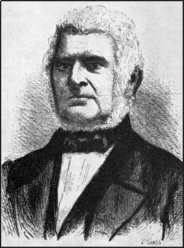- KIND
- GERMANY (see also List of Individuals)\
 6.6.1801 Linda/D - 9.3.1873 Saarbrücken/D\Carl G. Kind appears to have been a technically gifted boy working in mining areas of Saxony from age thirteen. As early as in 1823 he was involved in drilling experiments at the Borna Mine where he came into contact with the then famous experts. These tests were unsuccessful, however, and Kind left the state mining company. His first drilling close to Erfurt was made in 1831 to a depth of 230 m; it required large efforts because the pole mechanism broke more than 200 times. Drillings were advanced by hammering with a considerable effect on the mechanism. In 1834 the "glide scissors" were invented reducing impact forces of the hammer onto the drilling poles. Kind developed this mechanism and successfully drilled in Cessingen in 1837, and in Echternach in 1839. In 1842 he invented the so called Freifall which was patented in France. He succeeded to drill in 1846 to 736 m in Mondorf, Luxemburg, a world record for the following 25 years. A thermal spring led to the foundation of the Mondorf Bath, a location still profiting from Kind's work.\The Freifall opened the way to deep drillings both in mining engineering and in groundwater prospect. It was one of the important technical inventions of the early 19th century that allowed progress in engineering. Further progress occurred during a drilling close to Forbach around 1850. It became evident that a borehole needs a watertight lining by a conduit advanced parallel with the drilling head. This so called Kind-Chaudron procedure was awarded at the 1867 World Exhibition in Paris with the Gold Medal and initiated all later developments in drilling, both in the horizontal and in the vertical directions. Henry Darcy (1803-1858) profited from Kind's knowledge when making drilling experiments for the water supply of his home town Dijon in the 1830s. Yet, he finally decided to use spring water for Dijon. Later, as a city engineer of Paris, he must have come into personal contact with Kind who drilled the fountain of Passy.\Anonymous (1874). Carl Gotthelf Kind. Jahrbuch der Erfindungen 10: 402-403.Anonymous (1956). La Compagnie des houillères de Stiring. Houillères du bassin de Lorraine: 18-20. Lahure: Paris. PConrad, H.G. (1977). Kind. Neue Deutsche Biographie 11: 613-614. Duncker&Humblot: Berlin.Hoffmann, D. (1959). Kind und sein Werk. Zeitschrift Erdöl 75(10): 378-383. PKind, C.G. (1842). Anleitung zum Abteufen der Bohrlöcher nach den neuesten und bewährtesten Erfahrungen. Michaelis: Luxemburg. http://mapage.noos.fr/hubert.demory/puits.htm
6.6.1801 Linda/D - 9.3.1873 Saarbrücken/D\Carl G. Kind appears to have been a technically gifted boy working in mining areas of Saxony from age thirteen. As early as in 1823 he was involved in drilling experiments at the Borna Mine where he came into contact with the then famous experts. These tests were unsuccessful, however, and Kind left the state mining company. His first drilling close to Erfurt was made in 1831 to a depth of 230 m; it required large efforts because the pole mechanism broke more than 200 times. Drillings were advanced by hammering with a considerable effect on the mechanism. In 1834 the "glide scissors" were invented reducing impact forces of the hammer onto the drilling poles. Kind developed this mechanism and successfully drilled in Cessingen in 1837, and in Echternach in 1839. In 1842 he invented the so called Freifall which was patented in France. He succeeded to drill in 1846 to 736 m in Mondorf, Luxemburg, a world record for the following 25 years. A thermal spring led to the foundation of the Mondorf Bath, a location still profiting from Kind's work.\The Freifall opened the way to deep drillings both in mining engineering and in groundwater prospect. It was one of the important technical inventions of the early 19th century that allowed progress in engineering. Further progress occurred during a drilling close to Forbach around 1850. It became evident that a borehole needs a watertight lining by a conduit advanced parallel with the drilling head. This so called Kind-Chaudron procedure was awarded at the 1867 World Exhibition in Paris with the Gold Medal and initiated all later developments in drilling, both in the horizontal and in the vertical directions. Henry Darcy (1803-1858) profited from Kind's knowledge when making drilling experiments for the water supply of his home town Dijon in the 1830s. Yet, he finally decided to use spring water for Dijon. Later, as a city engineer of Paris, he must have come into personal contact with Kind who drilled the fountain of Passy.\Anonymous (1874). Carl Gotthelf Kind. Jahrbuch der Erfindungen 10: 402-403.Anonymous (1956). La Compagnie des houillères de Stiring. Houillères du bassin de Lorraine: 18-20. Lahure: Paris. PConrad, H.G. (1977). Kind. Neue Deutsche Biographie 11: 613-614. Duncker&Humblot: Berlin.Hoffmann, D. (1959). Kind und sein Werk. Zeitschrift Erdöl 75(10): 378-383. PKind, C.G. (1842). Anleitung zum Abteufen der Bohrlöcher nach den neuesten und bewährtesten Erfahrungen. Michaelis: Luxemburg. http://mapage.noos.fr/hubert.demory/puits.htm
Hydraulicians in Europe 1800-2000 . 2013.
